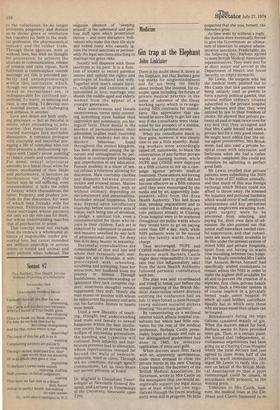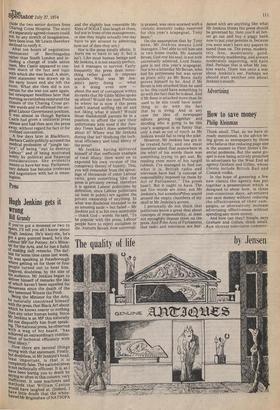Medicine
Gin trap at the Elephant
John Linklater
'There is no doubt about it, down at the Elephant, but that Barbara gets top marks for singlemindedness and for tiot being too finicky about method. She insisted, for example, upon including the future of private medical practice in the terms of reference of the Owen working party which is re-negotiating NHS contracts for consultants. She appreciates that she would be more likely to get her own way if the consultants were threatened by the prospect of a sudden, serious loss of personal income.
When the consultants stuck to their guns, however, it was clearly time to use a little anarchy. Building workers were accordingly tipped off, nationwide, to black the construction of any further private wards or nursing homes, while NUPE and COHSE were deployed as a fifth column to stir up a campaign against private medical treatment. These unions, not having any personal axes to grind, did not become effective as a fifth column until they were encouraged by the media and by an, apparently independent, edict from the Area Health Authority. This laid down that, pending negotiations and in order not to offend the unions, private patients already in Charing Cross hospital were to be scattered throughout the public wards where they would have to go on paying more than £20 a day, each, while NHS patients were to be moved into the luxury wards, free of charge. Thus encouraged, NUPE and COHSE redoubled their disruption. However much Barbara Castle might deny responsibility, it is certain that this inflammatory edict from the Area Health Authority followed personal consultation with her.
The plan was well co-ordinated and timed to break just before the annual meeting of the British Medical Association where doctors entering the conference hall on July 11 were forced to pass through young militant socialist pickets chanting "No private patients".
By concentrating on a sectional interest which affects hospital consultants but which had little relevance for the rest of the medical profession, Barbara Castle presumably hoped to divide and rule as her distinguished predecessor had done in 1945, by selective application of intra-oral gold. When doctors were first faced with an, apparently spontaneous, trade union demand to close the private wards in the new Charing Cross hospital, the Secretary of the British Medical Association, Dr Stevenson, wrote to Mrs Castle on the assumption that she would energetically support the legal status quo at least while her own negotiations through the Owen working party were still in progress. He little suspected that she was, herself, the hninence grise.
As time went by without a reply, the doctors were eventually forced to give the Government an ultima tum of intention to employ administrative sanctions. Predictably, on the following day, Barbara agreed to meet British Medical Association representatives. They were sent for at short notice and arrived at the Department of Health and Social Security on empty stomachs.
Mr Lewin, the surgeon who led the medical team, pointed out to Mrs Castle that sick patients were being unfairly used as pawns to force a purely political gambit, that several million ordinary citizens subscribed to the private hospital, bed schemes and that they were entitled by law to their freedom of choice. He showed that private patients all paid at least twice over for
any ,bed that they occupied and that Mrs Castle herself had used .a private bed for a very good reason.
He might have added that the union agent provocatrice, Mrs Brook stone, had also used a private ho spital room with television and bathroom when she had a rather offensive complaint: She could not therefore be agitating in perfect good faith.
Mr Lewin recalled that private patients were subsidising the NHS to the tune of £17 million annually, and that much of this was foreign exchange which Britain could not afford to throw away. He stressed the injustice and personal hardship which would occur if self-employed businessmen and key personnel among employees awaiting nonurgent surgery were to be prevented from selecting, and paying for, their own date of admission. He also pointed out that junior staff nowadays needed careful supervision, and that consultants are more readily available to do this under the present system of mixed NHS and private hospitals, apart from not having to waste time travelling between two hospi tals. He finally reminded Mrs Castle that Aneurin Bevan himself had specifically wished consultants to remain within the NHS in order to make the highest skill available for all and to prevent the creation of a separate, first class, private health service. Such a two-tier system is of course implicit in a privately owned trade union hospital to which all card holders contribute equally but in which only those who are more equal than others can be treated.
Refreshments during the nego tiations consisted mainly of gin. When the doctors asked for food, Barbara seems to have provided more gin. Then, at a certain point, she hinted that independent, si multaneous negotiations had been
going on at Charing Cross Hospital where the local doctors had just
agreed to close down half of the private ward immediately. She urged Mr Lewin to ratify this clo sure on behalf of the British Medical Association so that a joint communiqué could be issued, in accordance with protocol, to the waiting press.
Unknown to Mrs Castle, however, the medical team at the Elephant and Clastle happened to in elude the two senior doctors from Charing Cross Hospital. The story of a separately agreed closure could not, by any stretch of imagination, have been true. Mr Lewin therefore declined to ratify it. After ten hours of negotiation reminiscent of Berchesgaden rather than South London and including a change of trade union team, Mrs Castle appeared to concede much of the fact and logic With which she was faced. A short, Joint statement was drawn up in the early hours and she left the room. What she then did is not certain for she was not seen again, but newspaper headlines later that Morning nevertheless reiterated the closure of the Charing Cross private wards and re-affirmed the original Labour Government position. It was almost as though Barbara Castle had given a unilateral press release and had then sent the press away, without regard for fact Or for Civilised convention. •
' A few days later in Blackburn, Barbara Castle publicly accused the Medical profession of "jungle tactics", of being "out to destroy Labour" and of being motivated solely by political and financial Considerations. She evidently means to have her way. Parliamentat), debate has become irrelevant and negotiation with her is meaningless.




























 Previous page
Previous page